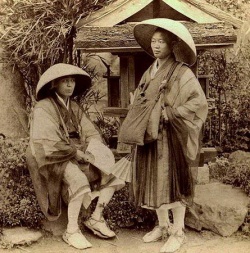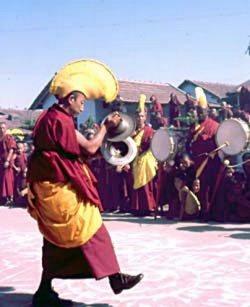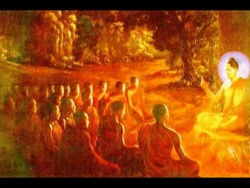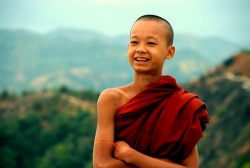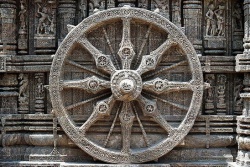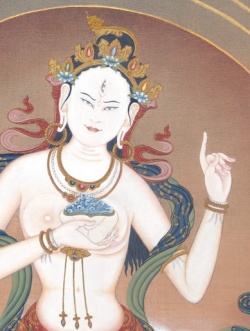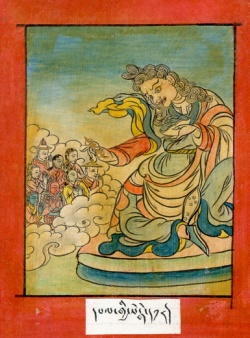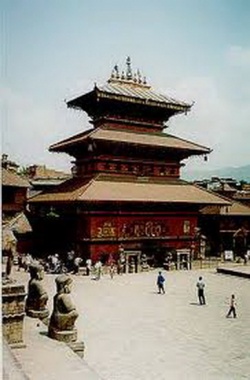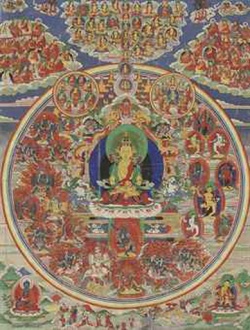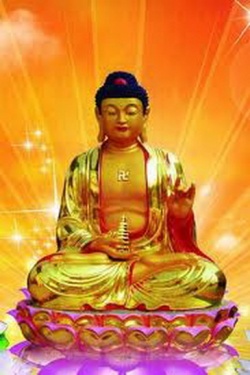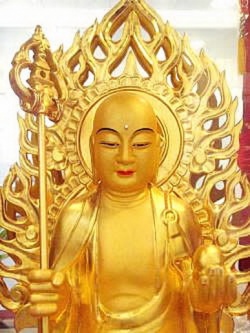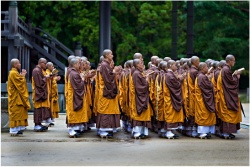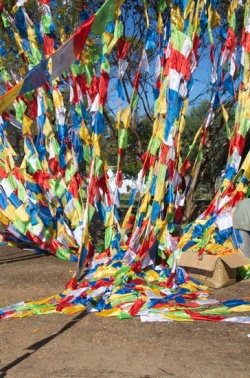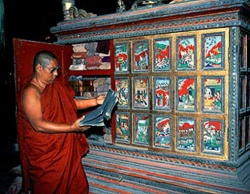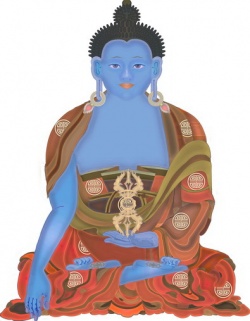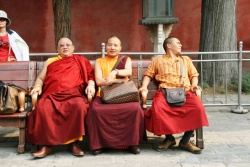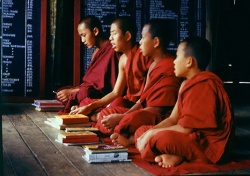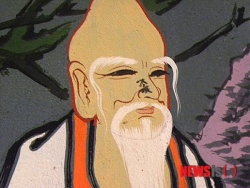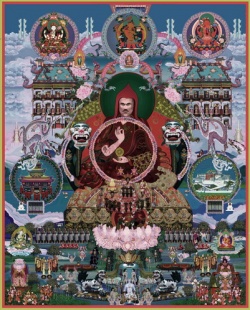75 sekhiyas
- See also :
- See also :
1st part, parimaṇḍala
sekhiya 1
"parimaṇḍalaṃ nivāsessāmīti sikkhā karaṇīyā."
To wear the lower robe correctly wrapped around oneself, so as to leave the edges level. The lower robe must be worn so as to cover the navel. The lower edge of this robe must be at eight finger-breadths below the knees, and the edge must be even all around.
Exceptions: In the following cases, a bhikkhu does not commit a fault by having his robes incorrectly placed around himself: the robe unfastens, or slides; le bhikkhu is not paying attention; the bhikkhu wears his robes too short or too long because of a wound; the bhikkhu wears his robe too short to avoid some existing danger.
sekhiya 2
"parimaṇḍalaṃ pārupissāmīti sikkhā karaṇīyā."
To wear the upper robe correctly wrapped around oneself, so as to leave the edges level. The lower edge of the upper robe must be at four finger-breadths below the knees, and the edges must be even all around.
Exceptions: (See sekhiya 1).
sekhiya 3
"suppaṭicchanno antaraghare gamissāmīti sikkhā karaṇīyā."
To close the robe up to the neck and down to the wrists when sitting in inhabited areas. A bhikkhu must completely close his robe around himself, up to the neck and covering his shoulders and arms in the following cases:
- when he leaves the monastery to go into an area inhabited by lay people;
- when he is doing his alms round;
- when he is invited to a meal;
- when he delivers a message;
- during the various ceremonies of the saṃgha (uposatha, pavāraṇā, recitations, etc.);
- when he turns up to give instructions to lay people;
- when lay people come to pay homage to the Buddha.
In addition to cases of emergency, a bhikkhu is not obliged by this rule in the following cases:
- when within a monastery;
- when in a place temporarily considered as his lodging (a place where he spends at least one night);
- when in an area uninhabited by laity.
sekhiya 4
"suppaṭicchanno antaraghare nisīdissāmīti sikkhā karaṇīyā."
To close the robe up to the neck and down to the wrists when present in inhabited areas. (See sekhiya 3).
sekhiya 5
"susaṃvuto antaraghare gamissāmīti sikkhā karaṇīyā."
To behave decorously when sitting in inhabited areas. When sitting in inhabited areas, it is necessary to adopt a restrained body posture, without playing about with the arms or legs.
sekhiya 6
"susaṃvuto antaraghare nisīdissāmīti sikkhā karaṇīyā."
To behave decorously when going to inhabited areas. When going to inhabited areas, it is necessary to adopt a restrained body posture, without playing about with the arms or legs.
sekhiya 7
"okkhittacakkhu antaraghare gamissāmīti sikkhā karaṇīyā."
To keep the eyes always lowered when sitting in inhabited areas. When sitting in inhabited areas, the gaze must be maintained lowered to a distance of about four cubits – around two metres – from oneself, directed to the ground, or the eyes must be kept closed.
sekhiya 8
"okkhittacakkhu antaraghare nisīdissāmīti sikkhā karaṇīyā."
To keep the eyes always lowered when going to inhabited areas. When going to inhabited areas, the eyes must be maintained lowered, directed to the ground, to a distance of about four cubits – around two metres – from oneself.
Naturally, to avoid danger, such as from passing vehicles, animals, etc., a bhikkhu can momentarily look around.
sekhiya 9
"ukkhittakāya antaraghare gamissāmīti sikkhā karaṇīyā."
Not to lift the robes when sitting in inhabited areas.
sekhiya 10
"ukkhittakāya antaraghare nisīdissāmīti sikkhā karaṇīyā."
Not to lift the robes when going to inhabited areas.
2nd part, ujjagghika
sekhiya 11
"ujjagghikāya antaraghare gamissāmīti sikkhā karaṇīyā."
Not to laugh loudly when sitting in inhabited areas.
sekhiya 12
"ujjagghikāya antaraghare nisīdissāmīti sikkhā karaṇīyā."
Not to laugh loudly when going to inhabited areas.
sekhiya 13
"appasaddo antaraghare gamissāmīti sikkhā karaṇīyā."
To speak only in a low voice when sitting in inhabited areas. Within an inhabited area, a bhikkhu should speak in such a way that a person at six cubits from him – around three metres – can hear clearly what he says, but in such a way that a person located at twelve cubits from him – around six metres – cannot hear what he says.
This rule does not apply in the case of a bhikkhu who is delivering a teaching.
sekhiya 14
"appasaddo antaraghare nisīdissāmīti sikkhā karaṇīyā."
To speak only in a low voice when going to inhabited areas. (See sekhiya 13).
sekhiya 15
"kāyappacālakaṃ antaraghare gamissāmīti sikkhā karaṇīyā."
Not to swing the body when sitting in inhabited areas. When in an inhabited area, a bhikkhu must always maintain his torso straight "like a stone statue", remaining still, without swinging his body.
sekhiya 16
"kāyappacālakaṃ antaraghare nisīdissāmīti sikkhā karaṇīyā."
Not to swing the body when going to inhabited areas.
sekhiya 17
"bāhuppacālakaṃ antaraghare gamissāmīti sikkhā karaṇīyā."
Not to swing the arms when sitting in inhabited areas.
sekhiya 18
"bāhuppacālakaṃ antaraghare nisīdissāmīti sikkhā karaṇīyā."
Not to swing the arms when going to inhabited areas.
sekhiya 19
"sīsappacālakaṃ antaraghare gamissāmīti sikkhā karaṇīyā."
Not to swing the head when sitting in inhabited areas.
sekhiya 20
"sīsappacālakaṃ antaraghare nisīdissāmīti sikkhā karaṇīyā."
Not to swing the head when going to inhabited areas.
3rd part, khambhakata
sekhiya 21
"na khambhakato antaraghare gamissāmīti sikkhā karaṇīyā."
Not to place the hands on the hips when sitting in inhabited areas.
sekhiya 22
"na khambhakato antaraghare nisīdissāmīti sikkhā karaṇīyā."
Not to place the hands on the hips when going to inhabited areas.
sekhiya 23
"na oguṇṭhito antaraghare gamissāmīti sikkhā karaṇīyā."
Not to cover the head when sitting in inhabited areas. If it is to protect his health in the winter climate, a bhikkhu does not commit a fault by covering his head.
sekhiya 24
"na oguṇṭhito antaraghare nisīdissāmīti sikkhā karaṇīyā."
Not to cover the head when going to inhabited areas. (See sekhiya 23).
sekhiya 25
"na ukkuṭikāya antaraghare gamissāmīti sikkhā karaṇīyā."
Not to stand on tiptoes or on the heels within inhabited areas.
sekhiya 26
"na pallatthikayā antaraghare nisīdissāmīti sikkhā karaṇīyā."
Not to sit with the knees raised and the arms wrapped around the legs when in inhabited areas.
sekhiya 27
"sakkaccaṃ piṇḍapātaṃ paṭiggahessāmīti sikkhā karaṇīyā."
To adopt a respectful attitude when going to collect food. It is advisable to go for the alms round holding the bowl properly on the arm(s), ahead of oneself, with a respectful and appreciative attitude. The food must not be accepted with an air of disgust.
sekhiya 28
"pattasaññī piṇḍapātaṃ paṭiggahessāmīti sikkhā karaṇīyā."
Maintain the attention on the bowl when going to collect food.
sekhiya 29
"samasūpakaṃ piṇḍapātaṃ paṭiggahessāmīti sikkhā karaṇīyā"
Not to accept more than one ration of curry for every three rations of rice when going to collect food. If during the daily round the curry offered risks exceeding this proportion, it must not be accepted. When estimating this proportion, one must count all the basic food such as the pastries, bread, cakes, etc. together with the rice.
sekhiya 30
"samatittikaṃ piṇḍapātaṃ paṭiggahessāmīti sikkhā karaṇīyā"
Accept food in proportion to the bowl, without exceeding its inner rim, when going to collect food. It is advisable not to accept more food than up to the rim of the bowl so as to avoid any spillage (the food must not bulge over the bowl). However, if the bowl is flat, a bhikkhu does not commit an offence by accepting food served on small dips made on the surface of the rice, or on the lid, or on another bowl.
4th part, sakkacca
sekhiya 31
"sakkaccaṃ piṇḍapātaṃ bhuñjassamīti sikkhā karaṇīyā."
Take care to adopt a respectful attitude when eating. The food must be eaten respectfully, without making faces to show that one does not appreciate a viand.
sekhiya 32
"pattasaññī piṇḍapātaṃ sikkhā karaṇīyā."
When eating, keep the attention on the bowl. During the meal, a bhikkhu must not look around himself. He must fix his gaze attentively on the contents of his bowl (or his plate).
sekhiya 33
"sapadānaṃ piṇḍapātaṃ bhuñjassamīti sikkhā karaṇīyā."
Eat the food one after the other, without rejecting any. A bhikkhu must eat (or serve himself) just as the food portions present themselves. He must not start from the centre. One he starts what he has in the bowl (or on a plate) from one side, he must continue taking the food from the same side, without starting another side.
sekhiya 34
"samasūpakaṃ piṇḍapātaṃ bhuñjassamīti sikkhā karaṇīyā."
Eat a ratio of one part of curry to three parts of rice. A bhikkhu must prepare each mouthful by mixing the curry and the rice in a ratio of around one part of curry to three parts of rice.
sekhiya 35
"na thupakato omditvā piṇḍapātaṃ bhuñjassamīti sikkhā karaṇīyā."
Not to take and eat food placed at the top of a heap of food, or flatten down a heap of food. A bhikkhu must not choose a morsel over others. He is obliged to serve himself by taking the food from the sliced side or from his side if the dish is not sliced. Thus, it is proper to always take food from a side, methodically so that the food on the centre drops towards the sides. When there are rests of food somewhat scattered in his bowl, these must be gathered into one pile and eaten from the same side.
sekhiya 36
"na sūpaṃ vā byañjanaṃ vā odanena paṭicchādessāmi bhiyyokamyataṃ upādāyāti sikkhā karaṇīyā."
Not to hide the curry under the rice in order to obtain more.
sekhiya 37
"na sūpaṃ vā agilānenā attano atthāya viññāpetvā bhuñjissāmīti sikkhā karaṇīyā."
Not to request and eat food if one is not ill. It is advisable to request food only from the members of one's family or from the dāyaka who have issued an invitation.
sekhiya 38
"na ujjhānasaññī paresaṃ pattaṃ olokessāmīti sikkhā karaṇīyā."
Not to look at someone else's bowl with jealousy. However, there is no fault in looking at the contents of someone else's bowl if it is with the purpose of giving him food if there is too little, or asking him for food if there is a large quantity.
sekhiya 39
"nātimahantaṃ kabaḷaṃ karissāmīti sikkhā karaṇīyā."
Not to eat by inserting large morsels in the mouth. A mouthful must not have a volume as larger than a peacock's egg.
sekhiya 40
"parimaṇḍalaṃ ālopaṃ karissāmīti sikkhā karaṇīyā."
To prepare mouthfuls of suitable proportions. Too large mouthfuls must not be inserted into the mouth in one go. It is proper to prepare portions of adequate proportions before inserting them into the mouth.
5th part, kabaḷa
sekhiya 41
"na anāhaṭe kabaḷe mukhadvāraṃ vivarissamīti sikkhā karaṇīyā."
Not to open the mouth before the food reaches its level. Ill bhikkhus are also bound by this rule.
sekhiya 42
"na bhuñjamāno sabbaṃ hatthaṃ mukhe pakkhipissāmīti sikkhā karaṇīyā."
Not to put the hand in the mouth, not even a finger.
sekhiya 43
"na sakabaḷena mukhena byāharissāmīti sikkhā karaṇīyā."
Not to speak with a full mouth. If there is only a small amount of food in his mouth, so that he can speak clearly, a bhikkhu does not commit an offence by speaking. However, a bhikkhu must not talk during his meal. To improve intonation when teaching, some bhikkhus may need placing a small fruit inside the mouth. In this case, they do not commit an offence.
sekhiya 44
"na piṇḍukkhepakaṃ bhuñjissāmīti sikkhā karaṇīyā."
Not to throw pieces of food into the mouth. Nevertheless, with regard to desserts and fruits, a bhikkhu can throw the food into his mouth without committing an offence.
sekhiya 45
"na kabaḷāvacchedakaṃ bhuñjissāmīti sikkhā karaṇīyā."
Not to eat cutting pieces de food with the mouth. When a piece of food is too large to be inserted into the mouth in one go, it must be cut preferably with the hands (or cutlery). However, it is allowed to cut pieces of food with the mouth (teeth) in the case of fruits or desserts that cannot be cut otherwise.
sekhiya 46
"na avagaṇḍakārakaṃ bhuñjissāmīti sikkhā karaṇīyā."
Not to fill the mouth with food so that the cheeks are inflated.
sekhiya 47
"na hatthaniddhunakaṃ bhuñjissāmīti sikkhā karaṇīyā."
Not to agitate the hands when eating. A bhikkhu can only shake his hands if he has wiped them up beforehand.
sekhiya 48
"na sitthāvakārakaṃ bhuñjissāmīti sikkhā karaṇīyā."
Not to scatter the rice when eating. Before making any signs with the hands, a bhikkhu must carefully pick any food stuck to the hands so that it falls in his bowl (or plate) and not around it.
sekhiya 49
"na jivhānicchārakaṃ bhuñjissāmīti sikkhā karaṇīyā."
Not to let the tongue out when eating.
sekhiya 50
"na capucapukārakaṃ bhuñjissāmīti sikkhā karaṇīyā."
Not to make noise in opening the mouth when eating.
6th part, surusuru
sekhiya 51
"na surusurukārakaṃ bhuñjissāmīti sikkhā karaṇīyā."
Not to make noise (slurp) when absorbing a liquid.
sekhiya 52
"na hatthanillehakaṃ bhuñjissāmīti sikkhā karaṇīyā."
Not to leak one's hand. When eating, a bhikkhu must not leak or suck his fingers or the palms of his hands. However, if he has no spoon, he is allowed to take gruel, honey or any other type of liquid food with his fingers and leak them.
sekhiya 53
"na pattanillehakaṃ bhuñjissāmīti sikkhā karaṇīyā."
Not to wipe the inside of the bowl (or the plate) when eating. It is proper to eat by taking with the end of the fingers (or with cutlery, without rattling) the food collected on the inner wall of the bowl, or on the sides of the plate, without making noise.
sekhiya 54
"na oṭṭhanillehakaṃ bhuñjissāmīti sikkhā karaṇīyā."
Not to leak the lips when eating. If, when eating, food sticks around the mouth, this must be inserted in the mouth by using the mouth itself or the fingers.
sekhiya 55
"na sāmisena hatthena pānīyathālakaṃ paṭiggahessāmīti sikkhā karaṇīyā."
Not to hold a vessel of water or a plate with a dirty hand. However, a bhikkhu does not commit an offence by holding with a dirty hand a vessel of water or a plate with the intention of washing them at once, or a pot containing water to wash the hands.
sekhiya 56
"na sasitthakaṃ pattadhovanaṃ antaraghare chaḍḍassāmīti sikkhā karaṇīyā."
Not to throw (a bowl's) washing up water containing rice in an inhabited area. When washing his bowl or other eating utensils in an inhabited area, a bhikkhu must not pour away water containing rice. The remaining rice must be lifted beforehand (to be eventually given to beggars or to animals). Otherwise, the rice must be crushed so that it disappears mixed with the water.
sekhiya 57
"na chattapāṇissa agilānassa dhammaṃ desessāmīti sikkhā karaṇīyā."
Not to teach the dhamma to someone holding an umbrella (unless he is ill).
sekhiya 58
"na daṇḍapāṇissa agilānassa dhammaṃ desessāmīti sikkhā karaṇīyā."
Not to teach the dhamma to someone holding a walking stick (unless he is ill).
sekhiya 59
"na satthapāṇissa agilānassa dhammaṃ desessāmīti sikkhā karaṇīyā."
Not to teach the dhamma to someone holding a cutting object (unless he is ill).
sekhiya 60
"na āvudhapāṇissa agilānassa dhammaṃ desessāmīti sikkhā karaṇīyā."
Not to teach the dhamma to someone holding a weapon (unless he is ill).
7th part, pāduka
sekhiya 61
"na pādukārūḷhassa agilānassa dhammaṃ desessāmīti sikkhā karaṇīyā."
Not to teach the dhamma to someone who is wearing shoes (unless he is ill).
sekhiya 62
"na upāhanārūḷhassa agilānassa dhammaṃ desessāmīti sikkhā karaṇīyā."
Not to teach the dhamma to someone who is wearing sandals (unless he is ill).
sekhiya 63
"na yānagatassa agilānassa dhammaṃ desessāmīti sikkhā karaṇīyā."
Not to teach the dhamma to someone who is inside a vehicle (unless he is ill). A bhikkhu can teach the dhamma to a person who is not ill sitting inside a vehicle only if he himself is also inside this vehicle.
sekhiya 64
"na sayagatassa agilānassa dhammaṃ desessāmīti sikkhā karaṇīyā."
Not to teach the dhamma to someone who is lying down (unless he is ill).
sekhiya 65
"na pallatthikāya nisinnassa agilānassa dhammaṃ desessāmīti sikkhā karaṇīyā."
Not to teach the dhamma to someone who is sitting with the knees raised and the arms around (unless he is ill).
sekhiya 66
"na veṭhitasīsa agilānassa dhammaṃ desessāmīti sikkhā karaṇīyā."
Not to teach the dhamma to someone wearing a turban (unless he is ill). A bhikkhu must not teach the dhamma to a person whose head is entirely covered by a cloth.
sekhiya 67
"na upāhanārūḷhassa agilānassa dhammaṃ desessāmīti sikkhā karaṇīyā."
Not to teach the dhamma to someone whose head is covered (unless he is ill).
sekhiya 68
"na chamāyaṃ nisīditvā agilānassa dhammaṃ desessāmīti sikkhā karaṇīyā."
Not to teach the dhamma to someone who sits on a rug spread on the ground while sitting directly on the ground (unless he is ill).
sekhiya 69
"na nīce āsane nisīditvā ucce āsane nisinnassa agilānassa dhammaṃ desessāmīti sikkhā karaṇīyā."
Not to teach the dhamma to someone sitting at a higher level (unless he is ill).
sekhiya 70
"na ṭhito nisinnassa agilānassa dhammaṃ desessāmīti sikkhā karaṇīyā."
Not to teach the dhamma to someone who is sitting while one is standing (unless he is ill). When the bhikkhus are standing to recite the "gāthā" (verses of the dhamma) to a congregation of lay people who are sitting, no offence is committed is there is at least one lay person standing.
sekhiya 71
"na pacchato gachchanto purato gacchantassa agilānassa dhammaṃ desessāmīti sikkhā karaṇīyā."
Not to teach the dhamma to someone who is walking ahead (unless he is ill).
sekhiya 72
"na uppathena gachchanto pathena gacchantassa agilānassa dhammaṃ desessāmīti sikkhā karaṇīyā."
Not to teach the dhamma to someone who walks on a footpath while one is walking to the side of this footpath (unless he is ill).
sekhiya 73
"na ṭhito agilāno uccāraṃ vā passāvaṃ vā karissāmīti sikkhā karaṇīyā."
Not to defecate or urinate standing up (unless required by medical reasons).
sekhiya 74
"na harite agilāno uccāraṃ vā passāvaṃ vā kheḷaṃ vā karissāmīti sikkhā karaṇīyā."
Not to defecate, urinate, or spit on the grass or on green plants (unless a medical reason prevents doing otherwise). If a bhikkhu is in a place completely covered by vegetation, he must find an area where the grass is dry to do his needs.
sekhiya 75
"na udake agilāno uccāraṃ vā passāvaṃ vā kheḷaṃ vā karissāmīti sikkhā karaṇīyā."
Not to defecate, urinate, or spit in proper water (unless a medical reason prevents doing otherwise). A bhikkhu must not defecate, urinate or spit in water to be used for drinking or for other purposes. He can however do so in the sea, or in toilet bowls containing water specifically for this purpose.
